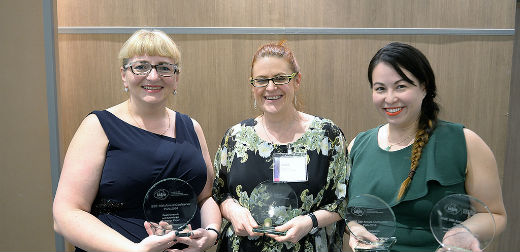Opinion: The language of course descriptions: does gender matter?

Award winners: Sally Jone, middle, with fellow winners, Natalie Vershinina, Birmingham University, right, and Angela Dy of Loughborough University, left, with their Best Paper in the Gender and Enterprise Track awards.
Despite more women entering higher education across the world they are less likely than men to choose an entrepreneurship course. Award-winning enterprise lecturer, Dr Sally Jones, explores what role gender-specific language plays in this.
Research increasingly argues that entrepreneurship is seen as masculine: reflecting high-profile entrepreneurs like Steve Jobs, Richard Branson, and Mark Zuckerberg. But does this focus on being a great and charismatic leader, competitive, ambitious and visionary, with masculine overtones, send out a distorted message?
This was the focus of the research for my-co researcher, Dr Jan Warhuus, of Aarhus University, Denmark, and I, as we set out to discover how entrepreneurs and entrepreneurship is presented in course descriptions.
Specifically, how gendered language constructs the ‘ideal’ entrepreneur, and the ‘ideal’, successful student.
Job descriptions
Course descriptions are similar to job advertisements. They seek to encourage students to sign up for courses based on their needs and interests and a conducive learning environment.
We know that the language in job descriptions discourages women from applying for jobs they perceive as masculinised. Where ‘excellence’, a ‘competitive environment’, or the need to be an ‘accomplished leader’ is emphasised.
This is not because women aren’t excellent or great leaders but because the language suggests a work environment where men are more likely to be accepted and to succeed.
This is due to societal perceptions of the differences between men and women.
We argue that students need to feel that they will be accepted and succeed in choosing courses. This is why we focused on course descriptions: they help students to decide if the course is for them but also if they are for the course.
International approach
We collected 86 course descriptions from 21 countries and analysed them for their use of gendered language.
We used validated indexes of characteristics broadly recognised as masculine and feminine. These included Bem’s Sex Role Inventory (BRSI) and a lexicon of gendered words developed by Gaucher et al in their analysis of job advertisements.
It is worth noting there are three main types of entrepreneurship education course. Those teaching ‘About’ entrepreneurship, which focus on a range of contexts, actors and approaches.
Those ‘For’ courses, which develop skills such as business idea generation, business planning or marketing.
And finally, there are ‘Through’ courses, where students ‘experience’ developing a business idea or engaging in entrepreneurial tasks and competitions. Such courses view students as entrepreneurs in the making.
Education for the boys?
We found that ‘About’ courses typically had a low level of masculine wording and were more likely to use feminine or gender-neutral language.
As we moved, however, to ‘For’ and ‘Through’ courses, the language became increasingly masculine.
It seems, if students are expected or encouraged to actually become entrepreneurs the language is highly masculine. Some ‘Through’ courses described entrepreneurship as a ‘contact sport’ and as ‘not for the meek and mild’.
And ‘About’ courses were broader and more inclusive in their approach, including social enterprise and a more diverse range of entrepreneurs, contexts and theories.
Mind your language
Our analysis suggests that gender does matter and that gendered language could be a barrier to certain students. This includes male students who don’t like overtly masculine environments.
To encourage a more diverse range of students to take their elective courses, regardless of discipline, educators should take note of the language in course descriptions.
Some courses also present a stereotypical and outdated view of what entrepreneurship is, not a true reflection of the diversity across the sector.
However, although we’ve identified gendered language in course descriptions, our research cannot tell us how students actually respond to this.
So we developed masculine, feminine or gender-neutral course descriptions and worked with students in the US and Denmark to see which courses they chose and why.
We hope to publish our research in the new year.
Future
Students need to be creative and flexible in their future career. And entrepreneurship education can help that by developing a range of transferable skills and knowledge to respond to developments, such as the gig economy, increasing self-employment and freelancing, and portfolio careers.
But entrepreneurship education should be inclusive, so as many students as possible can take advantage of the new skills, knowledge, networks and experiences it offers.
The solution could be as simple as changing the way educators talk about it.
